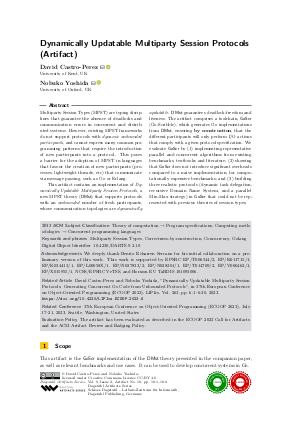Dynamically Updatable Multiparty Session Protocols (Artifact)
Authors
David Castro-Perez  ,
Nobuko Yoshida
,
Nobuko Yoshida 
-
Part of:
Issue:
Special Issue of the 37th European Conference on Object-Oriented Programming (ECOOP 2023)
Part of: Volume: DARTS, Volume 9 (ECOOP 2023)
Part of: Conference: European Conference on Object-Oriented Programming (ECOOP)
Part of: Journal: Dagstuhl Artifacts Series (DARTS) - License:
 Creative Commons Attribution 4.0 International license
Creative Commons Attribution 4.0 International license
- Publication Date: 2023-07-11
Artifact Description

PDF
DARTS.9.2.10.pdf
- Filesize: 0.49 MB
- 2 pages
Document Identifiers
Subject Classification
ACM Subject Classification
- Theory of computation → Program specifications
- Computing methodologies → Concurrent programming languages
Keywords
- Multiparty Session Types
- Correctness-by-construction
- Concurrency
- Golang
Metrics
- Access Statistics
-
Total Accesses (updated on a weekly basis)
0Document
0Metadata
Artifact
DARTS-9-2-10-artifact-3e53a6f7f7205c6beca84de5f3d9907a.tar.gz
(Filesize: 1.22 GB)
MD5 Sum:
3e53a6f7f7205c6beca84de5f3d9907a
(Get MD5 Sum)
Artifact Evaluation Policy
The artifact has been evaluated as described in the ECOOP 2023 Call for Artifacts and the ACM Artifact Review and Badging Policy
Abstract
Multiparty Session Types (MPST) are typing disciplines that guarantee the absence of deadlocks and communication errors in concurrent and distributed systems. However, existing MPST frameworks do not support protocols with dynamic unbounded participants, and cannot express many common programming patterns that require the introduction of new participants into a protocol. This poses a barrier for the adoption of MPST in languages that favour the creation of new participants (processes, lightweight threads, etc) that communicate via message passing, such as Go or Erlang. This artifact contains an implementation of Dynamically Updatable Multiparty Session Protocols, a new MPST theory (DMst) that supports protocols with an unbounded number of fresh participants, whose communication topologies are dynamically updatable. DMst guarantees deadlock-freedom and liveness. The artifact comprises a toolchain, GoScr (Go-Scribble), which generates Go implementations from DMst, ensuring by construction, that the different participants will only perform I/O actions that comply with a given protocol specification. We evaluate GoScr by (1) implementing representative parallel and concurrent algorithms from existing benchmarks, textbooks and literature; (2) showing that GoScr does not introduce significant overheads compared to a naive implementation, for computationally expensive benchmarks; and (3) building three realistic protocols (dynamic task delegation, recursive Domain Name System, and a parallel Min-Max strategy) in GoScr that could not be represented with previous theories of session types.
Cite As Get BibTex
David Castro-Perez and Nobuko Yoshida. Dynamically Updatable Multiparty Session Protocols (Artifact). In Special Issue of the 37th European Conference on Object-Oriented Programming (ECOOP 2023). Dagstuhl Artifacts Series (DARTS), Volume 9, Issue 2, pp. 10:1-10:2, Schloss Dagstuhl – Leibniz-Zentrum für Informatik (2023)
https://doi.org/10.4230/DARTS.9.2.10
BibTex
@Article{castroperez_et_al:DARTS.9.2.10,
author = {Castro-Perez, David and Yoshida, Nobuko},
title = {{Dynamically Updatable Multiparty Session Protocols (Artifact)}},
pages = {10:1--10:2},
journal = {Dagstuhl Artifacts Series},
ISSN = {2509-8195},
year = {2023},
volume = {9},
number = {2},
editor = {Castro-Perez, David and Yoshida, Nobuko},
publisher = {Schloss Dagstuhl -- Leibniz-Zentrum f{\"u}r Informatik},
address = {Dagstuhl, Germany},
URL = {https://drops.dagstuhl.de/entities/document/10.4230/DARTS.9.2.10},
URN = {urn:nbn:de:0030-drops-182505},
doi = {10.4230/DARTS.9.2.10},
annote = {Keywords: Multiparty Session Types, Correctness-by-construction, Concurrency, Golang}
}
Author Details
Acknowledgements
We deeply thank Benito Echarren Serrano for his initial collaboration on a preliminary version of this work. This work is supported by EPSRC EP/T006544/2, EP/K011715/1, EP/K034413/1, EP/L00058X/1, EP/N027833/2, EP/N028201/1, EP/T014709/2, EP/V000462/1, EP/X015955/1, NCSS/EPSRC VeTSS, and Horizon EU TaRDIS 101093006.
Related Article
- David Castro-Perez and Nobuko Yoshida, "Dynamically Updatable Multiparty Session Protocols: Generating Concurrent Go Code from Unbounded Protocols", in 37th European Conference on Object-Oriented Programming (ECOOP 2023), LIPIcs, Vol. 263, pp. 6:1-6:30, 2023. https://doi.org/10.4230/LIPIcs.ECOOP.2023.6
